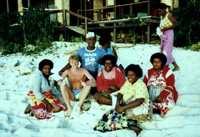
The Australian descendants of a Christian missionary eaten by cannibals 136 years ago, visited the 200 residents in a village in Fiji Thursday 13 November, hoping to eliminate a curse on the village where he was killed. The Fijian Prime Minister Laisenia Qarase also attended the ceremony.
Photo. Here you see me in a friendly conversation with local people at Beachcomber Island in Fiji in 1987. Fortunately the times have changed so I avoided ending up in the black pot and as dinner snack for the locals. Anyway I am not a missionary that try to change other peoples` way to live.
Rev. Thomas Baker was murdered in 1867 at Nubutautau, a remote community high in the hills of the South Pacific island of Viti Levu. Residents say their community have had bad luck since Baker was consumed and they blame his spirit for seeking revenge. The village has no electricity and only a jungle logging trail links it to the outside world. They say they have been regularly overlooked for developmental aid.
The clergyman's great-great-great-grandson, Dennis Russell, and 10 other family members went there and receive a traditional apology at an elaborate ceremony on Thursday. "They are obviously hurting so we are basically going over there to help them," Russell, 46, a coal miner from Brisbane said Tuesday (Australia, AP). Past apologies haven't helped. The last time the village said sorry was in 1993, when it gave Baker's boots to the Methodist Church of Fiji. From historical accounts: as one of the villagers said, who attended the meal: "We ate everything except the boots".
During the Thursday's ceremony, Baker's descendants received more than 100 sperm whale's teeth that are important and rare gifts in Fijian tribal society. There are differing accounts of Baker's terrible destiny. But a villager told The Associated Press last month that the tragic incident started when the village chief borrowed Baker's hat. Baker tried to take the hat back, but he didn't know that touching a chief's head was culturally taboo and punishable by death.
I hope that both the villagers and the descendants of Thomas Baker, will find peace in their souls after the ceremony.
Stein Morten Lund, 13 November 2003
Additional information:
The greatest cannibal of the all:
The chieftain Udre Udre from Fiji is the world record holder in eaten most people. This hungry man has eaten between 872 and 999 people in the 1800 century. He did it mostly as revenge against his enemies. To keep up-to-date how many he consumed, he places stones outside his house, one stone for each victim. The remained stones can today be counted by his grave in Rakairaki, on the northern part of the main island in the country.
His son could tell that his father always ate up all his parts of his enemies. He didn't eat almost anything else than human meat, and when he couldn't eat up everything immediately, he stored the meat. At that time they didn't have refrigerators, so he had to warm the meat up again.
I assume that Udre Udre had a very strong stomach. I just say: Good appetite!
